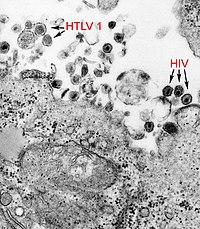
Photo from wikipedia
Background Seroprevalence studies are known to provide better estimates of the proportion of people previously infected, which did not undertake diagnostic testing. Repeated cross-sectional sero-studies are encouraged in the same… Click to show full abstract
Background Seroprevalence studies are known to provide better estimates of the proportion of people previously infected, which did not undertake diagnostic testing. Repeated cross-sectional sero-studies are encouraged in the same locations to monitor trends overtime. The aim of this study was to assess the seroprevalence among a random sample of vaccinated and non-vaccinated Palestinian adults living in the West Bank region of Palestine, irrespective of the source of antibodies, be it due to infection with COVID-19 or due to vaccination or both. Methods This repeated cross-sectional study used serologic testing on a random sample of vaccinated and non-vaccinated adults, 18 years and older residing in 11 governorates of the West Bank region of Palestine. Antibodies/Blood samples were taken using Elecsys Anti-SARS-CoV-2 assay by using the Cobas Analyzer cobas e 411 (Roche) for detection of antibody seropositivity against COVID-19. Seroprevalence was estimated as the proportion of individuals who had a positive result in the total SARS-CoV-2 antibodies in the immunoassay. Sociodemographic information and medical history data was collected using a questionnaire. Results Among 1451 total participants enrolled in the study, serum samples were tested from 910 persons. Study findings from this randomly selected sample indicated a seroprevalence 75.9%, 95% CI (73.1-78.7). The seroprevalence results indicated that the prevalence of antibodies among those who reported that they were not infected and did not get vaccinated was 45.2% with 95% CI (39.9-50.5%). The average age of participants was 37.6 years old. 49.2% were female and 50.8% were male. In relation to COVID-19, the following was found: Conclusion Our findings revealed a drastic rise in seroprevalence of SARS-CoV-2 antibodies. This information is useful for assessing the degree of herd immunity, and provides for better understanding of the pandemic. Population-based seroprevalence studies should be conducted periodically to monitor the SARS-CoV-2 seroprevalence in Palestine and inform policymakers about the efficacy of the surveillance system.
Journal Title: Vaccines
Year Published: 2022
Link to full text (if available)
Share on Social Media: Sign Up to like & get
recommendations!